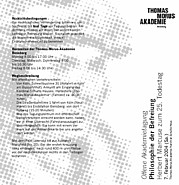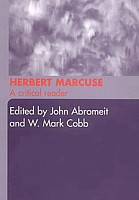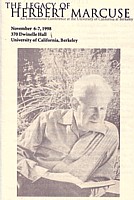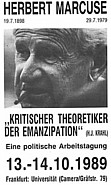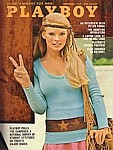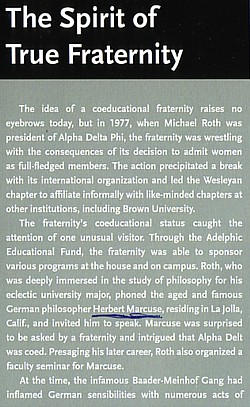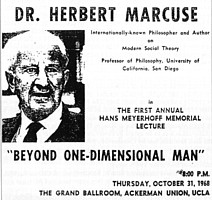| 2005
(back
to top)
- Apr. 15, 2005: Panel at the Amercan
Educational Research Association Conference in Montreal: "Marcuse's
Challenge to Education."
- Session abstract:
The Frankfurt School critical theorist Herbert Marcuse's
relationship with education is both historical and philosophical: historically,
Marcuse was the proponent the 60s New Left student movement, and philosophically,
Marcuse's analysis revealed the democratic impulse driving those movements.
Now, almost 25 years after his death, is Marcuse still relevant to education?
This panel will answer this question by arguing that Marcuse's work issues
a challenge to education to realize its practice as a force for political
contestation and democratic struggle against today's conditions of standardization,
high stakes testing, and "No Child Left Behind." Professor
Douglas Kellner, editor of Marcuse's collected papers and whose
work has convincingly argued for Marcuse's continued relevance, will serve
as moderator and respondent.
- Papers:
Clay Pierce, "Towards a Critical
Theory of Technology in Education: Marcuse and the Great Refusal"
Abstract: For Marcuse technology enables us to realize human potentials
and invigorates the imagination. Yet under standardization, technology
has been mostly used to reproduce technological rationality. Thus Marcuse's
concept of the "Great Refusal" enables educators to critique
current trends and realize technology in a democratic process.
Richard Van Heertum, "Marcuse, Bloch, and Freire:
Pedagogy of Hope"
Abstract: Thomas Jefferson argued that an educated and informed citizenry
is critical to democracy, but today democracy stands in jeopardy. This
paper will explore the implications of Marcuse's aesthetics in the enrichment
of our curriculum to invigorate democratic hope.
Richard V. Kahn, "Marcuse and the Dream of Humanitas"
Abstract: Marcuse articulates education for life as an articulation of
the classical notion of Humanitas. The current movement of high stakes
accountability is a form of "technical rationality" that threatens
this concept of Humanitas. The paper argues that Marcuse's vision of Humanitas
is important but ultimately too narrow and must be enlarged to address
today's ecological crisis in order to move beyond Eurocentrism.
Tammy Shel, "How can Marcuse's philosophy help to
understand the role of caring and moral education?"
Abstract: Marcuse's critique of technical rationality implicated science
in the undemocratic monopolization of political power. This paper will
call for a reconceptualization of science research for an educational pedagogy
of care.
Tyson Lewis, "Marcuse and the Multi-Dimensional Body"
Abstract: Under current standardization, funds for the arts are being cut.
As opposed to this trend, Marcuse would argue for a pedagogy of the senses
and an incorporation of the body into education. Thus in this paper, I
will assert that the arts are central to any notion of education for a
fully realized human subjectivity.
Daniel Cho, "Than[a]tos and Civilization: Lacan,
Marcuse, and the Death Instinct"
Abstract: Marcuse placed the question of human psychology at the center
of his political theory. He articulated the struggle for democratic liberation
with Freud's dialectic of the life instinct and the death drive. In education,
this dialectical tension between the two drives meets its practice in student
involvement in the political process. In this paper I both acknowledge
the importance of Marcuse's insight while also suggesting that Lacanian
psychoanalysis brings a new dimension to Marcuse's analysis.
Dolores Calderon, "Marcuse and the Challenge of New
Epistemologies"
Abstract: Marcuse called for new epistemologies in his critique of technological
rationalism and Eurocentrism. In this paper, I will further Marcuse's position
through a turn towards indigenous ways of knowing. For education, this
would entail giving voice to marginalized communities against standardization.
- May 18-20, 2005:
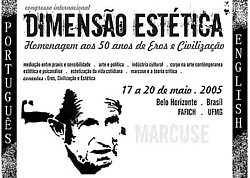 conference
"Dimensão Estética: Homenagem aos 50 anos de Eros
et Civilização," Belo Horizonte, Brazil. conference
"Dimensão Estética: Homenagem aos 50 anos de Eros
et Civilização," Belo Horizonte, Brazil.
- scans of 4-day program
available here
- conference webpage was at: http://www.fafich.ufmg.br/~dimensao/ (web
archive version, Nov. 28, 2004)
- The title in English: "The Aesthetic Dimension: Homage to 50 years
of Eros and Civilization"
- Note: "The Aesthetic Dimension" is the title of chapter 9
of Eros and Civilization (see E&C
contents), as well as of Herbert's last monograph, published in 1978.
- invited speakers included: Jeremy J. Shapiro, Shierry Nicholsen Weber,
Douglas Kellner, several German critical theorists associated with the
journal Zeitschrift für kritische Theorie, especially Gerhard
Schweppenhaueser and Thomas Friedrich.
- July 19, 2005: To mark Herbert's
107th birthday Doug
Ireland wrote an excellent blog entry, with reminiscences by Ron Aronson,
Lowell Bergman, Norman Birnbaum, Ariel Dorfman, Norman Geras, and Jeff
Weinstein (see the Scholars & Activists
Page for more information). The blog entry was a featured link from
ZNet, In These Times, and DissidentVoice.org. The marcuse.org homepage
received about 100-140 additional hits a day at this time.
note: 7/29/09: the article
is also published on Znet.
- Oct. 4, 2005: presentation
in Berlin by Dr. Wolfgang Lenk
 about
One-Dimensional Man. about
One-Dimensional Man.
"Klassiker der Kritik I: Herbert Marcuse - Der eindimensionale
Mensch (1964)"
Vortrag von Dr. Wolfgang Lenk, am 4. Oktober 2005 um 19.30 Uhr im Versammlungsraum
im Mehringhof, Gneisenaustr.2a, Berlin-Kreuzberg. Sponsored by the group
Anders arbeiten.
For more information contact: [email protected].
| Beschreibung:
Marcuses Buch stammt
unverkennbar aus dem sog. "goldenen Zeitalter" des Kapitalismus
- es diagnostiziert den "Sieg über das unglückliche Bewußtsein"
durch die Kräfte der Massenkultur, die Vergöttlichung von Arbeitsethos
und neuester Technologie. Und es war von größter Bedeutung für
die Revolte von 1968. Heute, in Zeiten des marktliberalen Umbaus, sind
wir erneut mit umfassenden Transformationen von Kultur, Technologie und
Menschenbild konfrontiert. Ist Marcuses eindimensionaler Mensch ein Vorläufer
des "flexiblen Menschen" (Richard Sennett), also eines vollständig
der Vermarktlichung unterworfenen Lebensmodells? Was macht seine Analyse
heute wieder lesenswert? Was unterscheidet die Bedingungen für Protest
damals und heute? |
Blurb:
Marcuse's book originated
unmistakably during the so-called "golden age" of capitalism
- it diagnoses the "victory over unhappy consciousness" by the
forces of mass culture, the worship of the work ethic, and by the latest
technology. And it was of great importance for the revolt of 1968. Today,
in a time of restructuring of the liberal market, we are again confronted
with comprehensive transformations of culture, technology and out image
of humanity. Is Marcuse's one-dimensional person a forerunner of "flexible
humans" (Richard Sennett), that is a model of life completely dominated
by marketing and consumption? What makes this analysis worth reading again
today? What differentiates between the conditions for protest at that time
and today? |
- Oct. 14, 2005: presentation in Starnberg
by KD Wolff, "Herbert Marcuse: Vernunft als erotische Energie"
(der Titel stammt nicht von ihm), in the Villa Böhler, (jetzt Montessori-Schule),
EUR 10.- Eintritt, veranstaltet vom Kulturbureau
Borst during Starnberg's "literarischer Herbst," . (See also
the entry on Wolff on the Scholars
& Activists Page.)
- Nov. 3-6, 2005:
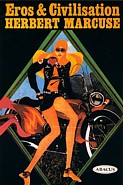 conference
"Reading Herbert Marcuse's Eros and Civilization after
50 Years" at St. Joseph's University in Philadelphia
PA, organized by Dr. Arnold Farr. conference
"Reading Herbert Marcuse's Eros and Civilization after
50 Years" at St. Joseph's University in Philadelphia
PA, organized by Dr. Arnold Farr.
See the conference
website with call for papers, registration form, and contact
information, as well as the program
for each of the 4 days.
Call for papers (due by June 30):
The Philosophy Department at Saint Joseph's University
invites paper submissions to a conference devoted to the fiftieth anniversary
of the publication of Herbert Marcuse's Eros and Civilization. Papers are
welcome on a wide range of topics: explication of Marcuse's project in
Eros and Civilization; its place in his social philosophy; the influence
of Marcuse's work in the past fifty years; its place in a critical theory
of society; the importance of Eros and Civilization for fields such as
psychology, aesthetics, and political philosophy; and prospects for a renewal
of Marcuse's approach to social philosophy.
- added 10/28/07: Russell
Rockwell's 5-paragraph summary of the conference
- Thursday
- Stewart Varner, Emory University, “Eros and Globalization”
- John Sanbonmatsu, Worcester Polytechnic Institute,
“Marcuse at the Arcade: Video Games, Repressive Desublimation, and
the Emergence of Postmodern Fascism in America”
- Todd Lavin, Clarion University,“Ego and Civilization:
A Sobering Response to Marcuse’s Eros and Civilization”
- Paul Guyer, University of Pennsylvania, “The
Aesthetics of Life: From Burke to Marcuse”
- Peter Marcuse, Columbia University, Commemorative
Address
- Charles Reitz, Kansas Community College, "Herbert
Marcuse on Aesthetic Education: Imagination, Death, and Reminiscence in
Eros and Civilization"
- Irving Kurki, Independent Scholar,“Marcuse and
the Search for a Global Alternative to Capital Domination”
- Friday
- Saby Ghoshray, Independent Scholar,“Understanding
America’s War on Terror Through the Lens of Marcuse’s Eros
and Civilization”
- Aydan Turanli, Istanbul Technical University,“The
Creation of the New Sensibility: Herbert Marcuse on Technology Critique”
- Jim Block, DePaul University,“Psychopolitics
and Vision: Marcuse’s Post-Modern Dialectic of Transformation”
- Daniel Malloy, Appalachian State University, “The
Two Bodies of Eros and Civilization: Marcuse’s Philosophy of the
Body”
- Espen Hammer, University of Essex, “Critical
Utopianism: Reflections on Marcuse and
Adorno”
- Stephen Bronner, Rutgers University, “Herbert
Marcuse and the Birth of Critical Political Theory”
- Peter-Erwin Jansen, Frankfurt, “Marcuse Reception
in Germany”
- Amy Wendling, Erik Anderson, Michael Brownstein, and
Jared Swanson, The Pennsylvania State University-- Panel Discussion: “Marcuse,
Social Change, and Technology”
- Saturday
- Russell Rockwell, Fordham University, “The Marcuse/Dunayevskaya
Correspondence and Marcuse’s “Philosophic Interlude”
in Eros and Civilization”
- Joshua Rayman, “Testing Marcuse’s Eros
and Civilization”
- Jeffrey Paris, University of San Francisco, “Beyond
the Repressive Hypothesis? In Defense of Eros and Civilization”
- Michael Schleeter, The Pennsylvania State University,
“The Ambiguous Reconciliation of Eros and Civilization”
- Douglas Kellner, UCLA,“Herbert Marcuse and the
Dialectics of Liberation: Reflections on the 50th Anniversary of Eros and
Civilization”
- Arnold L. Farr, St. Joseph’s University, “Toward
a Democratic Deconstruction and Reconstruction of Human Instincts: The
Possibility of Marcuse’s Impossible Imperative”
- John Abromeit, University of Chicago, “Eros and
Civilization, the Anthropology of the Bourgeois Epoch and the Persistence
of Backlash Politics”
- Mark Cobb, Pensacola Junior College, “hooks,
Lorde, and Marcuse: Exploring the Legacies of Eros and Civilization”
- Brian Lightbody, Brock University, “Can We Truly
Love That Which is Fleeting? An Examination of Eros, Time and Death in
Eros and Civilization”
- Sunday
- Liam Harte, Westfield State College, “Non-Repressive
Civilization or Tyranny of the Prosperous Majority? The Performance Principle
in the Marketist Age”
- Lucio Privitello, The Richard Stockton College of New
Jersey, “Teaching Marcuse: A Critical Pedagogy of Aesthetic Dimensions”
- Stephen Hedges, Washington Bureau, “The Marcuse-55
Model and the XXI Century”
- Jason Rovito, Ryerson University, “Communicating
the Historical Imperative: Marcuse in an Age of Irony”
- Zachariah Robert, Harvard Law School, "Play and
Performance: A Comparison of Hannah Arendt's and Herbert Marcuse's Politics"
- Mitchell Aboulafia, The Pennsylvania State University,
“Eros and Self-Determination”
- Mary Gennuso, CUNY, "Marcuse on Memory, Death
and Time"
- Andrew Payne, St. Joseph’s University, "Hedonism
and the Project of Eros and Civilization"
|
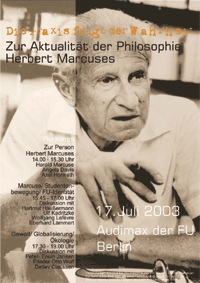
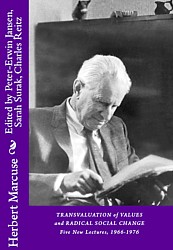
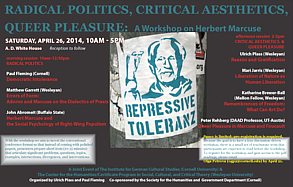
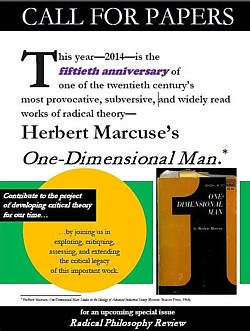
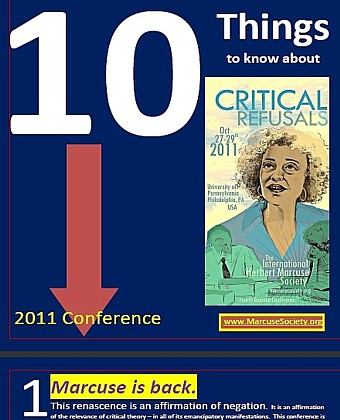
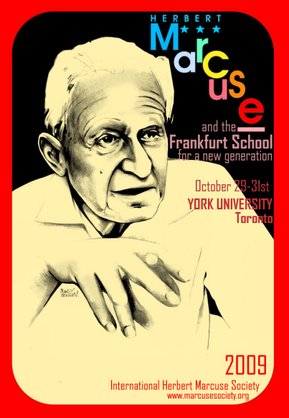
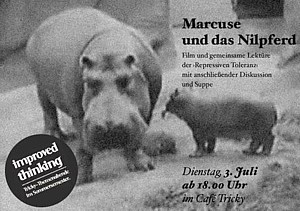

 about
One-Dimensional Man.
about
One-Dimensional Man. 
